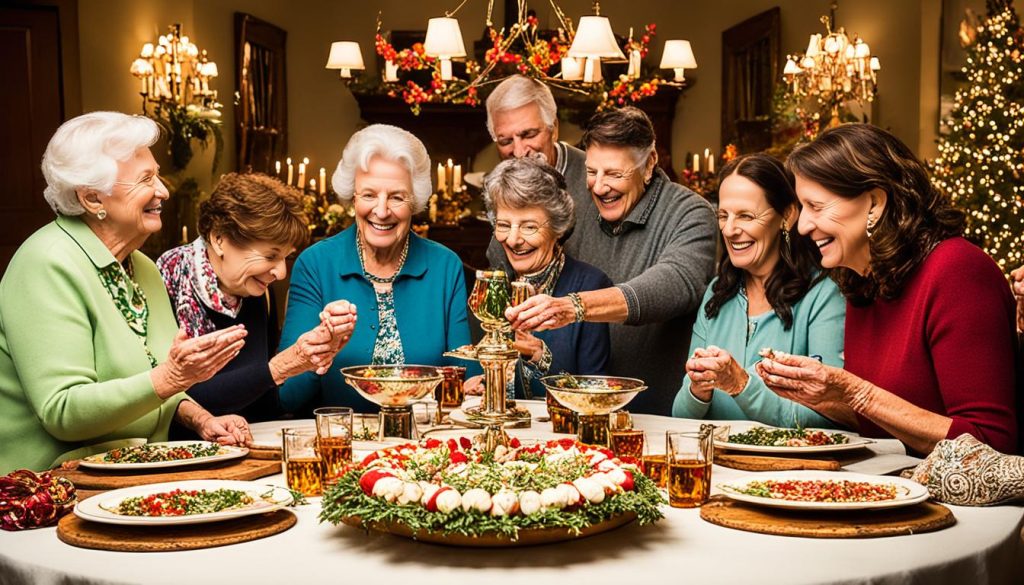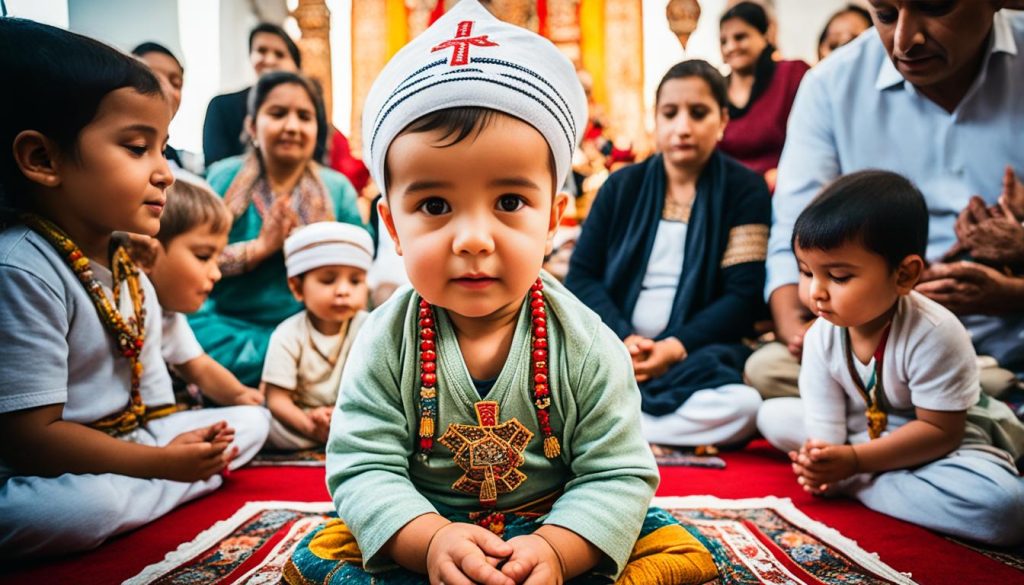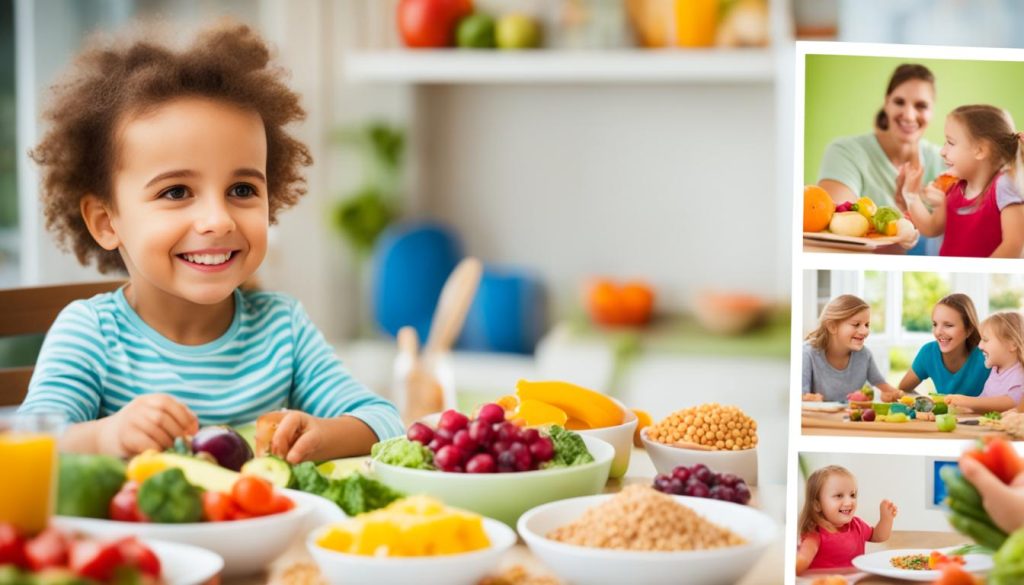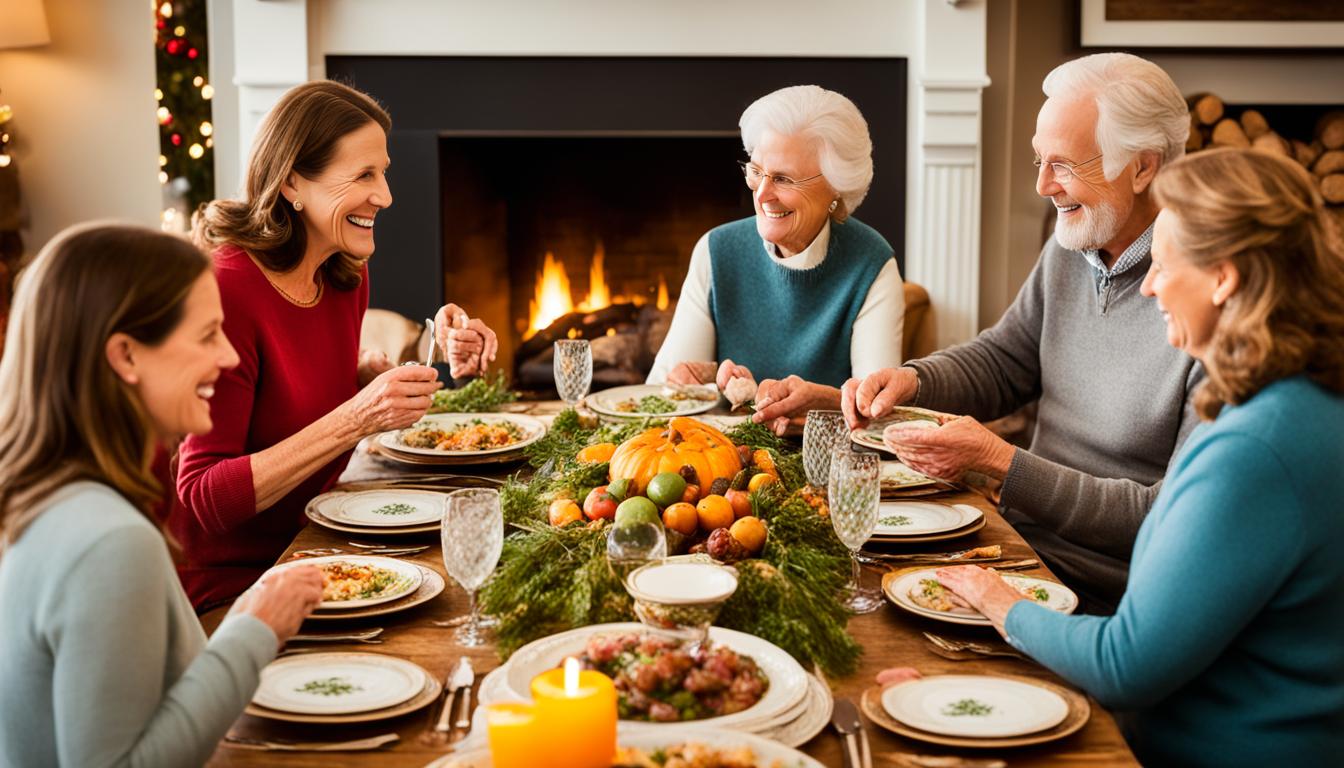It’s a late afternoon, and the sun shines warmly through your kitchen window. The smell of a family recipe fills the air, and laughter fills the halls. This scene might remind you of your own happy memories. Family rituals and traditions are more than just actions; they’re the heart of family bonds, offering a safe space in a changing world.
Studies from the American Psychological Association’s Journal of Family Psychology show how important these customs are for kids. They help kids feel secure, teach them respect and empathy, and boost their self-esteem. These traditions also offer stability in uncertain times. They help families feel connected and know who they are.
In today’s busy world, these rituals are even more precious. They’re like safe havens, holding us together through tough times. Sharing meals, vacations, or bedtime stories creates a special bond. This bond helps families stay united and emotionally strong.
Researchers Marshall Duke and Robyn Fivush found that knowing about family history makes kids feel better about themselves. It helps them be more resilient and respectful of others.
Key Takeaways
- Family rituals and traditions foster a deep sense of belonging and shared identity.
- These customs provide stability and predictability, critical for children’s emotional security.
- Regular family activities such as meals and vacations strengthen bonds and create lasting memories.
- Children with a strong sense of family history tend to have higher self-esteem and resilience.
- Incorporating rituals into daily life offers consistent comfort and support, enhancing family cohesion.
Understanding Family Rituals and Traditions
Family traditions and rituals are key to a family’s identity. They bring continuity across generations. These can be simple daily habits or big celebrations, each filled with emotional meaning. They help families feel closer and teach kids about responsibility and independence.
By doing these activities, families grow a strong sense of togetherness. They also help kids learn to be responsible and become more independent. Teaching kids responsibility is an important part of this.
Definition of Family Rituals
Family rituals are more than just daily habits. They carry deep emotional and symbolic meaning. They show who a family is and connect them across generations. Unlike daily tasks, rituals are filled with tradition and reflect a family’s values.
Types of Family Traditions
There are many kinds of family traditions, each adding to family unity. Some common ones are:
- Celebration Rituals: These are special activities for birthdays, holidays, and anniversaries.
- Personal Family Customs: This includes things like special greetings or bedtime stories.
- Community Engagement: Helping out at soup kitchens or clean-ups teaches kids about kindness.
Adding these traditions helps families share important values and heritage. For example, doing loving-kindness meditation together can make everyone more mindful and kind. Sharing family time or meals can also make families happier and support kids’ learning.

A study in the Journal of Family Psychology looked at 50 years of research. It found that family routines and rituals are key to a stable, happy family. They help with kids’ health, school success, and how happy parents are together.
| Type of Tradition | Benefits |
|---|---|
| Celebration Rituals | Enhance family unity, cultural heritage |
| Personal Customs | Foster child independence, create unique family identity |
| Community Engagement | Teaches kids responsibility, kindness |
| Cultural Practices | Pass down values, provide continuity |
Choosing the right family traditions and rituals is important. They help children feel secure, responsible, and independent. These activities are good for their emotional and overall health.
Benefits of Family Rituals for Emotional Intelligence in Children
Family rituals are key in helping kids grow emotionally. They give kids a safe space and help them feel secure. These activities create strong bonds and a stable home life, which is great for emotional growth.

Building Emotional Security
Regular family rituals make kids feel safe and connected. Studies show that kids who have these routines feel more part of the family. This feeling of belonging helps them grow and feel less stressed.
Knowing what to expect every day lowers their anxiety. It lets them focus on being creative and handling screen time well.
Improving Emotional Regulation
Family rituals also help kids control their feelings. When kids learn to name their emotions, they calm down faster after a tough day. Doing things like having family dinners together helps them talk about their feelings and react better.
These routines give kids a sense of comfort and help them understand their feelings. Adding activities that make them creative helps them express emotions in a healthy way.
A table summarizing the benefits of family rituals on children’s development further underscores these points:
| Aspect | Benefit |
|---|---|
| Emotional Security | Greater family cohesiveness and stress reduction by up to 60% |
| Emotional Regulation | Enhanced ability to manage emotions and recovery from stress |
| Behavioral Outcomes | Less engagement in risky behaviors and fewer behavioral problems |
| Academic Achievement | Better academic success and cognitive competence |
| Social Development | Improved social competence with peers and adults |
Adding family rituals can really help kids grow emotionally. It supports their development and well-being in many ways. It helps with screen time and encourages creativity in a safe, predictable space.
Creating Positive Parenting Through Family Rituals
Family rituals are key to building a caring and positive parenting style. They help parents create steady routines that help both them and their kids. These routines are the base for positive parenting and improve how parents and kids talk to each other. They also help with discipline.
Establishing Consistency and Routine
Being consistent and having routines is important for family rituals. Studies show that kids who get lots of love and touch grow emotionally and neurobiologically better. Rituals give kids a sense of security and help them feel stable, which is good for their feelings.
Setting clear rules and sticking to them is important for kids to grow. This can be part of daily life. For example, having clear rules and consequences for breaking them helps kids learn and grow.

Spending special time with your child also strengthens your bond and makes them feel better about themselves. Just 10 minutes of talking without distractions can make a big difference in your relationship. These moments are great for teaching kids right from wrong in a caring way.
Enhancing Parent-Child Communication
Talking well with your child is key to positive parenting. Saying “I love you” often helps kids feel secure and attached. Listening to them and understanding their feelings builds respect and a strong bond.
Rituals make talking easier by sharing experiences that encourage open conversation. Family meals are a great time to connect, share stories, and talk about your day. Families who eat together often have stronger relationships and better mental health.
Family rituals and traditions are great for positive interactions and building strong family ties. They make kids feel safe and predictable, especially when things change. This sets the stage for good parenting.
| Benefits of Family Rituals | Positive Impact on Children |
|---|---|
| Creating a sense of security and belonging | Helps children feel safe and grounded |
| Consistent boundaries and consequences | Fosters healthy growth and development |
| Active and empathetic listening | Promotes mutual respect and stronger bonds |
| Regular family meals | Enhances communication and mental health |
| One-on-one quality time | Boosts self-esteem and parent-child bonding |
The Role of Family Meals: A Key Family Ritual
Family meals are key to good nutrition and growth in kids. They help build strong family bonds and a sense of togetherness. Even with busy schedules, making time for meals together has big benefits.

Research by The National Center on Addiction and Substance Abuse at Columbia University shows that eating together often helps teens do better in school. Kids who have 5 to 7 family dinners a week tend to get better grades. Plus, eating without phones makes meals more relaxing and fun.
Family meals do more than help with schoolwork. A study of 21,400 kids found that eating together often makes kids happier and less likely to take risks. It shows how family meals play a big part in helping kids grow up healthy and learn right from wrong.
Even though more meals are eaten out or on the move—like 19% in the US—making family dining a priority is good for health. Families who eat together tend to eat healthier than those who don’t. This helps kids eat better and supports their growth and health.
“Family meals create opportunities for promoting wellness, shaping and reinforcing family behaviors, and fostering a shared sense of identity and tradition.”
Setting a goal to eat together at least twice a week can make family life better. This simple act boosts communication, strengthens family values, and plans fun activities for everyone. It’s tough to balance work and family, but eating together helps families bond and grow closer.
Strengthening Family Bonds and Identity Through Traditions
Family traditions are key to a strong parent-child bond and building resilience in kids. They create memories that bring family members closer together. These traditions also pass down important values and ethics from one generation to the next.
By doing family activities regularly, you help build your family’s shared memory and identity. This strengthens relationships that last a lifetime.
Creating Shared Memories
Shared memories keep a family close, acting as anchors through time. Studies show that family traditions help with emotional stability and reduce bad behaviors. Kids who take part in these traditions feel a stronger bond with their parents and become more resilient.
Activities like family game nights or regular meals together are great examples. Kids who eat with their families often have better relationships, do better in school, feel more confident, and are more resilient. Letting kids help with cooking and meal prep also helps them succeed in life.
Passing Down Family Values
Teaching kids to be grateful is a big part of family traditions. These rituals help pass down what’s important in the family. This way, the next generation learns the values and morals of their ancestors.
Celebrating holidays with certain traditions helps the family bond and teaches values like gratitude and kindness. Regular family meetings keep communication open. This is key for teaching kids to be grateful and creating a safe space.
The table below shows how important family traditions are. They help build a strong family identity and make kids more resilient:
| Family Activity | Benefits |
|---|---|
| Family Meals | Improved family relationships, better academic performance, higher self-esteem, and greater resiliency |
| Game Nights | Increased family satisfaction and improved bonding |
| Chores Together | Enhanced participation and collective memory |
| Regular Check-Ins | Maintained open communication and reinforced family values |
These examples show how family traditions deeply impact family bonds and the well-being and resilience of children.
Family Rituals and Child Development Milestones
Family rituals are key to your child’s growth. They help with school success and mental health. Studies show that regular family routines are good for kids.
Impact on Academic Achievement
Kids who have family rituals do better in school. These rituals give them stability and predictability. This helps them manage their feelings and emotions better.
Children do well in environments that are predictable. They learn to be resilient and open to new things. This is because of a growth mindset for kids.
- Family meals are a chance for talking about school and getting support.
- Bedtime routines help kids get enough sleep, which is key for thinking well.
- Reading together every day makes kids love books and learning.
Supporting Mental Health and Well-being
Family rituals also help kids’ mental health. They give kids a way to deal with stress and change. Doing things together, like going on outings or sharing what you’re thankful for, makes kids stronger.
Talking openly during family time lowers stress and boosts happiness.
- Knowing what to expect makes kids feel safe and secure.
- Doing things together helps kids behave better and make friends, especially for immigrant families.
- Talking at meals is good for kids’ minds and bodies.
Family rituals are more than just fun activities. They are key for your child’s growth. By doing these rituals, you help your kids grow and stay mentally healthy.
The Evolution of Family Rituals in Diverse Family Structures
Family rituals have changed a lot to fit the changing nature of diverse family structures. In the past, people got married for reasons like property or social class. Now, love, companionship, and choice play a big role in marriage.
This change led to more divorces from 1860 to 1910. During tough economic times, like the Great Depression, fewer people got married and had kids. But after World War II, the economy got better, and there was a big increase in new homes and kids born.
By 2008, more women in the U.S. were working outside the home. Now, over 62% of Americans see marriage as a partnership where both parents share in child care and household duties. This includes families with same-sex parents, single parents, and blended families, all adding to the mix of parenting in the digital age.
Even with these changes, family rituals are still important and have adapted to new family types. In 2012, the U.S. birth rate was at a record low, showing how families are adjusting to new priorities and lifestyles.
The table below shows how these changes have affected diverse family structures:
| Time Period | Main Marital/Familial Trends | Impact on Family Rituals |
|---|---|---|
| 19th – Early 20th Century | Marriages primarily for property rights/social class mobility | Rituals focused on economic and social stability |
| 1860 – 1910 | Divorce rate tripled due to choice, companionship, and romantic love | Emergence of companionship-oriented family rituals |
| Great Depression | Decline in marriage/birth rates due to unemployment | Adapting rituals to financial constraints |
| 1950s | Economic boom, construction of 13 million homes | Rituals centered around familial prosperity |
| 2008 | 50% of the labor force comprised of women | Rituals adapted to gender workforce equity |
| 2012 | American birth rate at its lowest point | Rituals reflecting modern, individualized family priorities |
Today, it’s crucial to teach kids about diversity through these changing rituals. This helps them understand the different kinds of families today. These changes show how family rituals help support and celebrate each family’s unique path in parenting in the digital age.
Incorporating Cultural and Religious Traditions in Parenting and Raising Kids
Parenting gets richer when we blend cultural and religious traditions into our lives. These traditions give kids a sense of where they belong and shape who they are. They help kids grow socially and emotionally.
Religious Traditions
Religious traditions are key in teaching kids important values and manners. They include everything from prayer to celebrating holidays. These activities help kids see their role in the world.
Studies show that being part of religious activities can make family bonds stronger and improve kids’ emotional health (Reference 7). These beliefs also encourage parenting that values respect, empathy, and kindness.
A 2019 study found that prayer can help kids deal with tough behaviors, bringing them peace and stability. These rituals help families share values and strengthen their relationships. This can also lower stress for parents, as seen in a 2016 study (Reference 6).
Cultural Practices and Family Identity
Cultural traditions are important for kids to understand who they are. They engage in activities like storytelling and dance that show their heritage. A 2019 study said that culture affects how parents discipline their kids, depending on the culture.
Kids from individualistic cultures see themselves as unique, while those from collectivist cultures value relationships more (2019 study). This shows how parenting styles can shape how kids see themselves and interact with others.
| Aspect | Impact on Child Development |
|---|---|
| Religious Traditions | Enhance emotional well-being, teach values, and reduce parenting stress. |
| Cultural Practices | Support identity formation and nurture child creativity through cultural activities. |
| Discipline Methods | Vary between individualistic and collectivist cultures, influencing social behaviors. |
Adding cultural and religious traditions to parenting helps in teaching kids manners. It also builds a supportive environment for their growth and development.
Conclusion
Family rituals and traditions give your home a sense of security and continuity. They help with emotional well-being and teach children important life skills. About 60% of people say open communication with kids is key for their emotional health and confidence.
Doing family activities together makes memories and gets kids ready for kindergarten by teaching them a routine. Over 40% of people value teaching kids to be independent and responsible. Almost 30% say giving kids chances to explore and learn is important.
Adding cultural and religious traditions makes your child’s life richer and more complete. About 20% of people want to change old ways of discipline to be more positive. This change can make families less stressed and improve mental health in teens.
In the end, family rituals and traditions are vital for growing emotionally, intellectually, and socially. They help with tantrums and getting kids ready for school. Keep making your traditions fit your family’s changing needs.
FAQ
What are family rituals and traditions?
How do family rituals contribute to emotional security in children?
What are the benefits of family meals as a key family ritual?
How do family rituals support positive parenting?
What impact do family rituals have on a child’s academic achievement?
How can family traditions strengthen family bonds and identity?
How do family rituals evolve in diverse family structures?
What role do cultural and religious traditions play in parenting?
Why are family routines important during times of stress and transition?
How do family rituals impact children’s emotional intelligence?
This post contains affiliate links. If you click on a link and make a purchase, I may earn a small commission — at no extra cost to you. Thank you for supporting this blog and helping me keep the patterns free! Read the full Affiliate Disclosure & Transparency.
